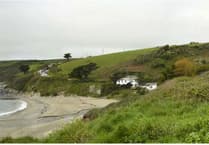A Cornish man who had his arm amputated in August 2022 has ridden the wave of success to become an English Adaptive Surfing champion.
Newquay’s Stephen Downes, 48, who underwent an extended full fore quarter amputation of his left arm, shoulder, collarbone, three ribs and a proportion of his chest wall after being diagnosed with a rare cancer in June last year, won the open category at the English Surfing Para Open, held at North Devon’s Putsborough Beach.
In May 2022, Stephen found a lump in his neck. A series of scans and a biopsy revealed that lump to be a myxofibrosarcoma. The mango-sized tumour went from his clavicle – the area between the shoulder and the neck, down to his rib cage.
Sarcomas are a rare type of cancer that develop in bone or soft tissue and are often difficult to detect, to diagnose and to treat.
Despite the loss of his arm Stephen was determined to surf again.
“When the surgeons at Derriford first told me they would be able to remove the tumour, but to do so it would necessitate the amputation of my arm – the first thing I said to them, was, ‘you can’t, I’m a surfer’,” he said.
A lifelong surfer for 40 years, Stephen first made it back into the water in February this year and despite previously being a stand-up surfer made the decision to start kneeboarding.
“Following the initial shock of the diagnosis, I started to think how best I’d be able to get back in the water,” he said. “I decided fairly early on that to get back into the sea, surfing – kneeboarding might be my best option. At the time, the main advantage I could see, was that a lot of kneeboarders use flippers, rather than solely using their arms to paddle. Added to that I thought it would be easier to get to my knees than getting to my feet with the one arm.
In August, 12 months on from the lifesaving, life-changing surgery, Stephen participated in the Welsh Adaptive Open at The Wave in Bristol, where he came second in his category to fellow Cornish surfer, Louis Sutton.
To participate in any para or adaptive contest surfers must first be classified. The classifications have been determined by the ISA, the International Surfing Association, which is the world governing authority for surfing and is recognised by the International Olympic Committee.
Classification is a process whereby certified para-surfing classifiers assess the strength, flexibility, balance, and coordination of competitive adaptive surfers in order to group the athletes with permanent impairments into one of the nine classes. The aim of classification is to accurately allocate the athlete into their best surf class to ensure high levels of competition and to try and ensure a more levelled playing field.
Unfortunately for Stephen, the classifications meant he would not be able to compete in the kneeboard category, due to the fact he is an upper limb amputee and ISA classifications stipulate that division is only open to lower limb amputees.
“When I first heard that I was gutted,” he said. “A big part of my recovery was built on the dream of participating in adaptive event as a kneeboarder, so to have that dream seemingly quashed before it had even began was hard to take. But then I was contacted by Welsh and world champion para kneeboarder Lleywelyn ‘Sponge’ Williams, who was organising the Welsh event – he told me they’d be running an open category for surfers such as myself who didn’t meet any of the nine classifications.”
Surfing England also took the decision to run an open category at this year’s English Surfing Para Open which enabled Stephen to participate in the event.
The competition saw athletes travel from all over the UK and from places, such as Japan and Saudi Arabia.
“It was an amazing day,” said Stephen. “The vibe from all those involved in and around the adaptive surf tribe is fantastic. Every person competing has a story, everyone there has overcome some sort of adversity, but more than anything, everyone there is a surfer – so to be a part of it, is a privilege.”




